Galway Shell to Sea: Shell! Stop Toying With the life of Maura Harrington
 galway |
rights, freedoms and repression |
news report
galway |
rights, freedoms and repression |
news report  Thursday September 18, 2008 17:32
Thursday September 18, 2008 17:32 by TD - Shell to Sea
by TD - Shell to Sea
Overtaken by serendipity?
Now that today's expressions of solidarity for Maura in Galway have been serendiptously overtaken by Shell's announcement that "the Solitaire will leave Killybegs today for a UK Port where deep water berthing facilities are available," at the risk of wrongly second guessing her, a sweet and honourable ending to her hunger strike is, surely, in the offing.?
At 12.30PM this afternoon, Shell to Sea along with "Concerned friends of Maura" handed in a written request to the secretary of Honorary Norwegian Consul in Galway, Ray Rooney, urging the Norwegian government to intervene on humanitarian grounds to ameliorate the situation.
To the Norwegian Government.
As the main shareholder of Statoil, we urge you to instruct Statoil to exert corporate pressure on its Corrib Consortium partners, Marathon, and in particular, Shell to issue an urgent definitive statement as has been asked for by prominent politicians and well known film director Ken Loach as to the intentions of the pipe-laying vessel Solitaire owned by the Allseas company. Amnesty International has also commented on the repression of citizens by States that collude in the interests of oil companies above the welfare of their citizens. Maura Harrington, who up to very recently was the local primary school headmistress is now going into her tenth day of a hunger strike. She intends to continue with her hunger strike until the owner of the Solitaire expresses the intention to leave Irish territorial waters. The current feeling is that due to damage to the ship's pipe laying stinger, it will be more than likely that the Solitaire will not be returning to Broadhaven Bay this year. if this is the case, then in order to minimize any further health deterioration to Maura, it is vital that the ship proceeds to leave Irish waters. We know that the Norwegians are an honourable and fair people and have been deeply dismayed by what has gone on, in their name, in north Mayo. Please move urgently to resolve this standoff before it is too late.
Concerned friends of Maura
After this was effected, Shell to Sea joined others in Shop Street to highlight the plight of this brave , unbending woman; now in the throes of her 10th day onhunger strike.
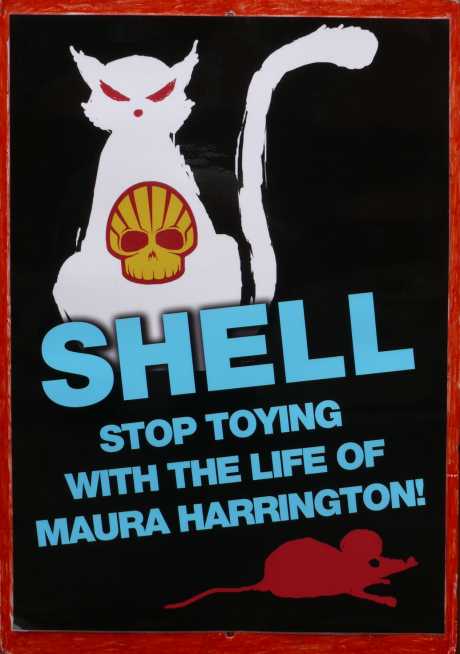
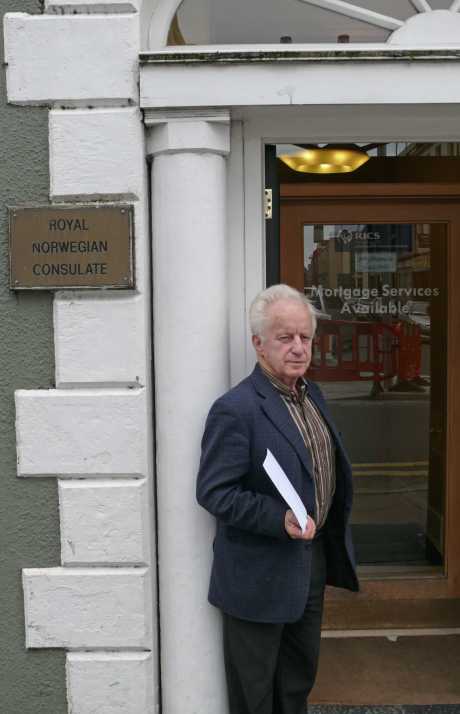
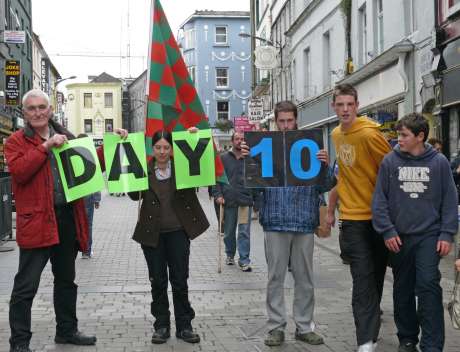
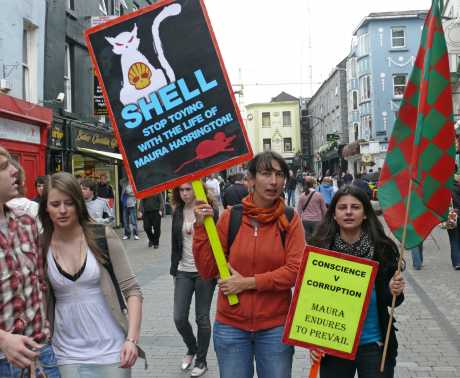
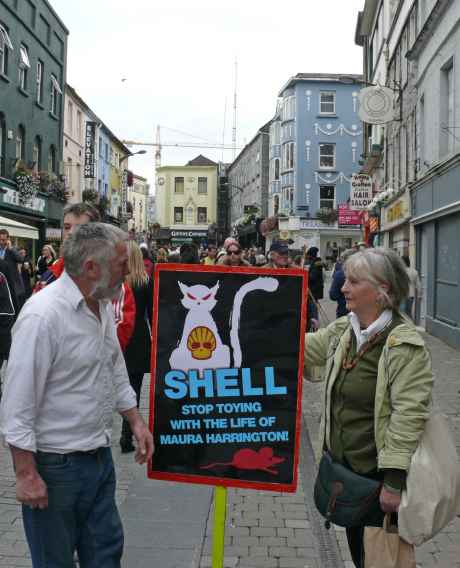
Comments (2 of 2)
Jump To Comment: 1 2Given the happy departure of the Solitaire, one hopes this is merely a communication breakdown (not uncommon within the movement over the past week) between Galway S2S and Maura rather than yet a new set of demands for an expanded hunger strike.
This should be made clear at 3 pm today when Maura releases a statement. The sections of the movement which have made this unliateral action its centrepiece for the past week will have to reassess its position after the statement is released.
Critiques of the hunger strike and the focus on the broken ship (rather than the pipes) ...
Solitaire No Longer Relevant - Leviatahn Tries to Lay Pipes to Mayo and Falls Flat on It's Face
http://www.indymedia.ie/article/89140
10th. Day of Mayo Hunger Strike - the Death Train No One Seems to Be Able to Get Off!
http://www.indymedia.ie/article/89157
...we'd like to use it in the Art Not Oil 2008 gallery,
ta,
Mark
PS. We'd love any other images to consider, Shell-related or beyond! Here's some info we've sent to artists asking them to respond to the production of the Shell-sponsored 'Oedipus' in London:
---------------
Hi,
I hope you're OK.
Shell is sponsoring the National Theatre's new production of 'Oedipus',
and, unsurprisingly, Art Not Oil is preparing a response on various
fronts. As someone who has had a connection of some sort to our project,
we're asking if you might be up for making a piece of work of some kind as
a response to this Shell deal? This could be to appear on our website, or
on a postcard or something similar. (Unfortunately, we aren't able to pay
for your work, but we have no wish to possess it!)
If this is of interest, we'd love to see it as soon as possible, as
'Oedipus' runs until January 2009 only.
Food for thought can be found in the Shell's Wild Lie gallery:
http://www.artnotoil.org.uk/gallery/v/Shell/
Let us know if you'd like some quotes from the play to help get a sense of
their production, or a more detailed Shell critique.
We could do with a hand designing a basic 'What's wrong with Shell?'
postcard as well.
If these aren't for you, how about letting us have any work you think may
fit the bill for the 2009 Art Not Oil online gallery? Also, we're looking
for help with our website, and designers for a book we're putting together
about the project so far.
Thanks and good luck,
----------------------------
This is what the NT says: 'The people of Thebes look to Oedipus to lift a
terrible curse from them and their city. He consults the oracle and learns
that he must root out the late king’s murderer. But his relentless
interrogation of one man after another leads inexorably, and in the space
of a single day, to his own savage conclusion...You are who you are
seeking to find.'
This is the letter we sent to those involved with the production:
'Dear
I’m part of a group of climate activists that is very concerned at the way
oil companies appear to be using sponsorship of major cultural
institutions to divert public attention from their complicity in the
climate crisis. We have been campaigning since 2004 for art and oil no
longer to be seen to be compatible, using a combination of direct action,
lobbying and our own grassroots exhibitions.
This year we were very heartened to hear that our ‘Shell’s Wild Lie’
campaign had paid off, and that Shell was no longer to be the sponsor of
the Natural History Museum’s ‘Wildlife Photographer of the Year’
exhibition. But remaining complacent was hardly an option, as Shell in
particular was moving its sponsorship activities well into overdrive,
focussing its attentions on pumping money into its neighbours on the South
Bank, including the production of ‘Oedipus’ that you’re currently a part
of.
Sometimes when we’re out campaigning on the oil sponsorship issue, people
praise what they see as the companies’ generosity in putting money into
the arts. Our response is to ask what those companies are getting in
return for that outlay, and – if it is an enhanced reputation - whether
they deserve it.
Both Shell and BP are still heavily implicated in producing ever-greater
quantities of the oil and gas that are destabilising our climate to such
an alarming degree. Climate change is set to wipe out millions of plant
and animal species and to devastate the poorest regions of the planet.
Shell and BP’s activities also result in oil spills which are major causes
of death and destruction for many varieties of life. Shell’s planned
refinery and pipeline project in County Mayo, Ireland, threatens a
pristine ecosystem, not to mention the homes and livelihoods of the
inhabitants. It is poised to drill in the newly-melted waters of the
Chukchi Sea off Alaska. It is still burning off unwanted gas in the Niger
Delta, making local people’s lives a living hell. Lastly, it is currently
constructing a massive development at Sakhalin Island in Russia which is
threatening the survival of the Western Pacific Grey Whale. You can find a
detailed critique of Shell’s activities following this letter…
As part of our campaign, we've put together a 'Shell's Wild Lie'
counter-exhibition, which paints what we hope is a truer portrait of Shell
and of wider impacts of climate change on people and wildlife. We've taken
it around the UK as well as to the gates of the Natural History Museum.
It's also up online at www.artnotoil.org.uk/gallery/v/shell
I’d like to make it clear that our campaign isn’t about standing in
judgement over artists who find themselves caught in the crossfire of
climate chaos-era oil industry public relations. What we’re asking is that
– if you haven’t already done so - you make yourself aware of the issues,
and consider whether there’s anything you can do, individually or
collectively, to turn this situation around. It does seem that events –
geopolitical, social, economic, ecological and climatic – are coming to a
head, and that now is possibly the last chance we have to come together
and stand up for justice and a liveable future. (I hope you’ll forgive the
melodramatic tone, but that really does seem to be where we’re at in
September 2008.)
It would be good to hear any feedback you may have, and we would also be
keen to know if you have any advice as to how we might make oil companies
unwelcome in our major cultural institutions, while ensuring a ‘just
transition’ for people working in them towards jobs that no longer rely on
fossil fuelled support.
Thanks for reading, and good luck for the future...'
***************************
This is taken from Wikipedia:
Oedipus (pronounced /__d_p_s/ in American English or /_i_d_p_s/ in British
English; Greek: ____π___ Oidípous meaning "swollen-footed") was a
mythical Greek king of Thebes. He fulfilled a prophecy that said he would
kill his father and marry his mother, and thus brought disaster on his
city and family. This legend has been retold in many versions, and was
used by Sigmund Freud to name the Oedipus complex.
The story
Oedipus and the Sphinx, by Jean Auguste Dominique Ingres, c. 1805. Oedipus
was the son of Laius and Jocasta. Before his birth it was
prophesied that he would murder his father. To avoid this calamity, the
child given to a herdsman who was told to kill him. The herdsman, out of
pity and yet fearing to disobey, instead gave him to another herdsman,
tying his feet together and piercing them with a stake (which caused him
to permanently have swollen feet – hence one meaning of Oedipus which
translates to "swollen foot"; it also comes from the Greek root meaning
knowledge). The herdsman took the infant Oedipus to his master, the king
of Corinth, Polybus, who adopted him as his own son.
Many years later Oedipus is told that he is not the son of Polybus. To
confirm this, he seeks help from an oracle and is told that he is destined
to kill his father and mate with his mother. In his attempt to evade the
dictates of the oracle, he decides to flee from home to Thebes on the
other side of the mountains.
As Oedipus was travelling by horse to Thebes, he came to a crossroads
where he met a chariot, which, unbeknownst to him, was driven by Laius,
his true father. A dispute arose over right of way, and the outcome was
that Oedipus killed Laius. Continuing his journey to Thebes, Oedipus
encountered the Sphinx, who stopped any traveller and asked him a riddle
that none had yet been able to solve. If the traveller failed, he was
eaten by the Sphinx. The riddle was “What walks on four feet in the
morning, two in the afternoon and three at night?" The answer was “Man."
Oedipus solved the riddle, and the Sphinx threw herself to her death. The
gratitude of the Thebans led them to appoint Oedipus as their king.
Oedipus was also given the widow Jocasta (who was also his mother) as his
wife. Over the years, Oedipus and Jocasta had four children – two sons,
Polynices and Eteocles (see Seven Against Thebes), and two daughters
Antigone and Ismene (see Antigone).
Many years after the marriage of Oedipus and Jocasta, a plague struck the
city of Thebes. Oedipus, with his typical hubris, asserted that he could
and would end the plague. He sent Creon, Jocasta's brother to the Oracle
at Delphi seeking guidance and finds that the murderer of Laius must be
found and either killed or exiled. In a search for the identity of the
killer, Oedipus sends for the blind prophet Tiresias, who warns him not to
try to find the killer. In an angry exchange, Tiresias tells Oedipus that
he is the killer and suggests that he is living in shame and doesn't know
who his true parents are. Undaunted, Oedipus continues his search. When a
messenger arrives from Corinth with the news that Polybus is dead, Oedipus
still worries about the prophecy that he will mate with his mother. The
messenger reassures him with the news that he is adopted. Jocasta then
realizes who Oedipus is and goes in to the palace to kill herself. Oedipus
seeks verification of the messenger's story from the very same herdsman
who was to have left Oedipus to die as a baby. From that herdsman, Oedipus
learns that the infant raised as the adopted son of Polybus and Merope was
the son of Laius and Jocasta. Thus, Oedipus finally sees that at the
crossroads he had killed his own father, and then he had married his own
mother, Jocasta.
Oedipus goes in search of Jocasta and finds she has killed herself. Taking
brooches from her gown, Oedipus blinds himself. Oedipus leaves the city,
and his daughter Antigone acts as his guide as he wanders blindly through
the country, ultimately dying at Colonus, after being placed under the
protection of Athens by Theseus, its king.
His two sons Eteocles and Polynices arranged to share the kingdom, each to
take an alternating one-year reign. But Eteocles refused to give up his
kingship after his year was up. Polynices then brought in an army, a
battle ensued, and at the end of the battle the brothers killed each
other. Jocasta's brother Creon then took the throne. He made the decision
that Polynices was the "traitor," and should not be buried. Defying this
edict, Antigone did attempt to bury her brother, and Creon ultimately had
her killed – leading to tragedy for all of Creon's family. There are
variants on this story's ending.
Significant variations on the Oedipus legend are mentioned in fragments by
several ancient Greek poets including Homer, Hesiod and Pindar. Most of
what is known of Oedipus comes from a set of plays by Sophocles: Oedipus
the King, Oedipus at Colonus, and Antigone.
Indymedia Ireland is a media collective. We are independent volunteer citizen journalists producing and distributing the authentic voices of the people. Indymedia Ireland is an open news project where anyone can post their own news, comment, videos or photos about Ireland or related matters.